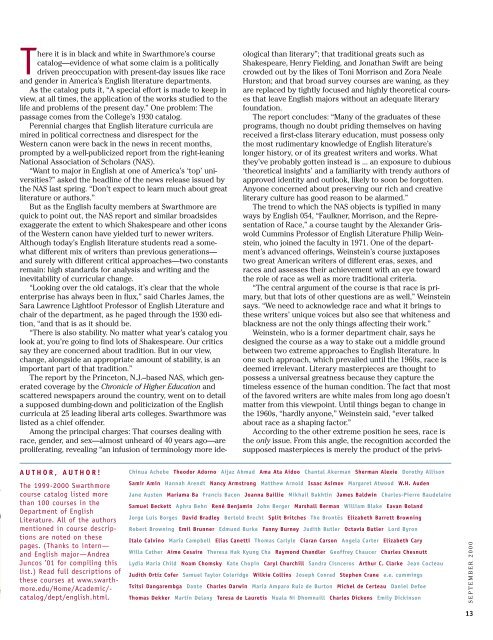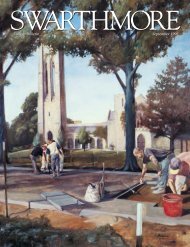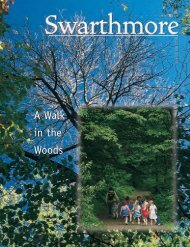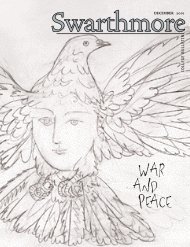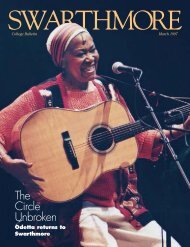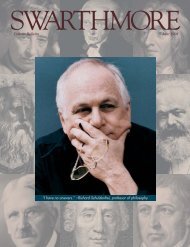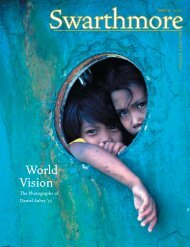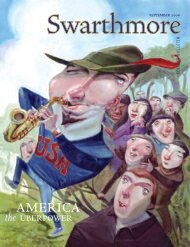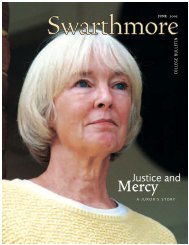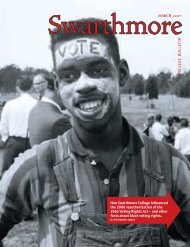SWARTHMORE
Swarthmore College Bulletin (September 2000) - ITS
Swarthmore College Bulletin (September 2000) - ITS
- No tags were found...
Create successful ePaper yourself
Turn your PDF publications into a flip-book with our unique Google optimized e-Paper software.
There it is in black and white in Swarthmore’s coursecatalog—evidence of what some claim is a politicallydriven preoccupation with present-day issues like raceand gender in America’s English literature departments.As the catalog puts it, “A special effort is made to keep inview, at all times, the application of the works studied to thelife and problems of the present day.” One problem: Thepassage comes from the College’s 1930 catalog.Perennial charges that English literature curricula aremired in political correctness and disrespect for theWestern canon were back in the news in recent months,prompted by a well-publicized report from the right-leaningNational Association of Scholars (NAS).“Want to major in English at one of America’s ‘top’ universities?”asked the headline of the news release issued bythe NAS last spring. “Don’t expect to learn much about greatliterature or authors.”But as the English faculty members at Swarthmore arequick to point out, the NAS report and similar broadsidesexaggerate the extent to which Shakespeare and other iconsof the Western canon have yielded turf to newer writers.Although today’s English literature students read a somewhatdifferent mix of writers than previous generations—and surely with different critical approaches—two constantsremain: high standards for analysis and writing and theinevitability of curricular change.“Looking over the old catalogs, it’s clear that the wholeenterprise has always been in flux,” said Charles James, theSara Lawrence Lightfoot Professor of English Literature andchair of the department, as he paged through the 1930 edition,“and that is as it should be.“There is also stability. No matter what year’s catalog youlook at, you’re going to find lots of Shakespeare. Our criticssay they are concerned about tradition. But in our view,change, alongside an appropriate amount of stability, is animportant part of that tradition.”The report by the Princeton, N.J.–based NAS, which generatedcoverage by the Chronicle of Higher Education andscattered newspapers around the country, went on to detaila supposed dumbing-down and politicization of the Englishcurricula at 25 leading liberal arts colleges. Swarthmore waslisted as a chief offender.Among the principal charges: That courses dealing withrace, gender, and sex—almost unheard of 40 years ago—areproliferating, revealing “an infusion of terminology more ideologicalthan literary”; that traditional greats such asShakespeare, Henry Fielding, and Jonathan Swift are beingcrowded out by the likes of Toni Morrison and Zora NealeHurston; and that broad survey courses are waning, as theyare replaced by tightly focused and highly theoretical coursesthat leave English majors without an adequate literaryfoundation.The report concludes: “Many of the graduates of theseprograms, though no doubt priding themselves on havingreceived a first-class literary education, must possess onlythe most rudimentary knowledge of English literature’slonger history, or of its greatest writers and works. Whatthey’ve probably gotten instead is ... an exposure to dubious‘theoretical insights’ and a familiarity with trendy authors ofapproved identity and outlook, likely to soon be forgotten.Anyone concerned about preserving our rich and creativeliterary culture has good reason to be alarmed.”The trend to which the NAS objects is typified in manyways by English 054, “Faulkner, Morrison, and the Representationof Race,” a course taught by the Alexander GriswoldCummins Professor of English Literature Philip Weinstein,who joined the faculty in 1971. One of the department’sadvanced offerings, Weinstein’s course juxtaposestwo great American writers of different eras, sexes, andraces and assesses their achievement with an eye towardthe role of race as well as more traditional criteria.“The central argument of the course is that race is primary,but that lots of other questions are as well,” Weinsteinsays. “We need to acknowledge race and what it brings tothese writers’ unique voices but also see that whiteness andblackness are not the only things affecting their work.”Weinstein, who is a former department chair, says hedesigned the course as a way to stake out a middle groundbetween two extreme approaches to English literature. Inone such approach, which prevailed until the 1960s, race isdeemed irrelevant. Literary masterpieces are thought topossess a universal greatness because they capture thetimeless essence of the human condition. The fact that mostof the favored writers are white males from long ago doesn’tmatter from this viewpoint. Until things began to change inthe 1960s, “hardly anyone,” Weinstein said, “ever talkedabout race as a shaping factor.”According to the other extreme position he sees, race isthe only issue. From this angle, the recognition accorded thesupposed masterpieces is merely the product of the privi-A U T H O R , A U T H O R !The 1999-2000 Swarthmorecourse catalog listed morethan 100 courses in theDepartment of EnglishLiterature. All of the authorsmentioned in course descriptionsare noted on thesepages. (Thanks to intern—and English major—AndreaJuncos ’01 for compiling thislist.) Read full descriptions ofthese courses at www.swarth-more.edu/Home/Academic/-catalog/dept/english.html.Chinua Achebe Theodor Adorno Aijaz Ahmad Ama Ata Aidoo Chantal Akerman Sherman Alexie Dorothy AllisonSamir Amin Hannah Arendt Nancy Armstrong Matthew Arnold Isaac Asimov Margaret Atwood W.H. AudenJane Austen Mariama Ba Francis Bacon Joanna Baillie Mikhail Bakhtin James Baldwin Charles-Pierre BaudelaireSamuel Beckett Aphra Behn René Benjamin John Berger Marshall Berman William Blake Eavan BolandJorge Luis Borges David Bradley Bertold Brecht Split Britches The Brontës Elizabeth Barrett BrowningRobert Browning Emil Brunner Edmund Burke Fanny Burney Judith Butler Octavia Butler Lord ByronItalo Calvino Maria Campbell Elias Canetti Thomas Carlyle Ciaran Carson Angela Carter Elizabeth CaryWilla Cather Aime Cesaire Theresa Hak Kyung Cha Raymond Chandler Geoffrey Chaucer Charles ChesnuttLydia Maria Child Noam Chomsky Kate Chopin Caryl Churchill Sandra Cisnceros Arthur C. Clarke Jean CocteauJudith Ortiz Cofer Samuel Taylor Coleridge Wilkie Collins Joseph Conrad Stephen Crane e.e. cummingsTsitsi Dangarembga Dante Charles Darwin Maria Amparo Ruiz de Burton Michel de Certeau Daniel DefoeThomas Dekker Martin Delany Teresa de Lauretis Nuala Ni Dhomnaill Charles Dickens Emily DickinsonS E P T E M B E R 2 0 0 013


